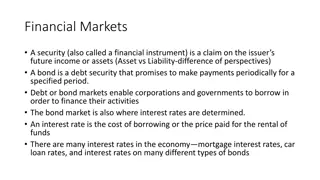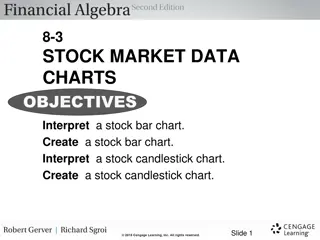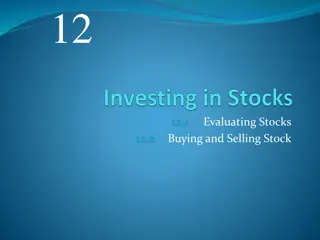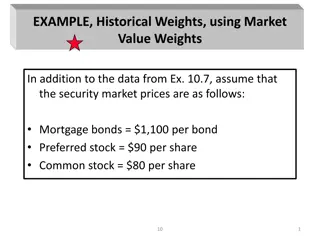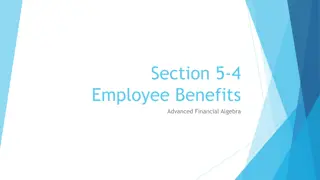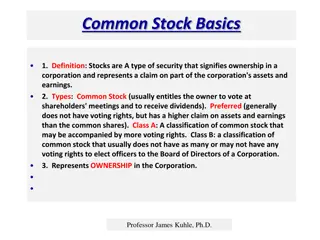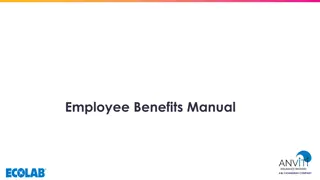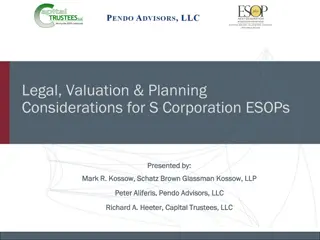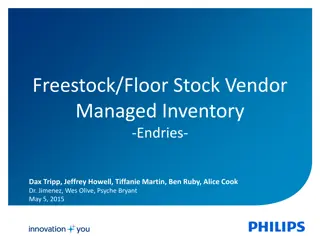Maximizing Employee Stock Plans
Employee stock plans offer valuable benefits and potential financial gains, but understanding how to navigate them effectively is key. Learn about stock options, vesting schedules, tax implications, and different types of employee stock plans to make the most of these incentives.
Download Presentation

Please find below an Image/Link to download the presentation.
The content on the website is provided AS IS for your information and personal use only. It may not be sold, licensed, or shared on other websites without obtaining consent from the author.If you encounter any issues during the download, it is possible that the publisher has removed the file from their server.
You are allowed to download the files provided on this website for personal or commercial use, subject to the condition that they are used lawfully. All files are the property of their respective owners.
The content on the website is provided AS IS for your information and personal use only. It may not be sold, licensed, or shared on other websites without obtaining consent from the author.
E N D
Presentation Transcript
Getting the Most Out of Employee Stock Plans
Employer Stock Options (Not Options you Trade on the Open Market) What is an option? The right to buy the stock at a certain price Employee Stocks Why do you get them? Work performance or job related Company wants you to stick around (they have vesting schedule) Why are they good? If you have the right to buy at $5/share, and the stock goes up to $15/share, you get to pocket $10/share. That $10 is called the bargain element
Employer Stock Options What to watch out for? Grant Dates Vesting Dates (standard 3 year cliff or 20% per year for 5 years, or other) Expiration Dates Stock Price Movement Taxes Employee Stocks
Option Types and Taxes Common Misconceptions: The right to buy, but not the requirement to put up cash to buy them Exercise & Hold vs Exercise & Sell (Exercise & Sell is cashless) Employee Stocks Option Types and Taxes: ISOs Incentive Stock Options (ran into this with MMM) May be eligible for capital gains treatment Must be held for 1 year after exercise and 2 years from grant date (whichever is longer) NSOs Non-qualified Stock Options The bargain element will be subject to ordinary gain rates
Option Types and Taxes ISOs Incentive Stock Options (ran into this with MMM) May be eligible for capital gains treatment Must be held for 1 year after exercise and 2 years from grant date (whichever is longer) NSOs Non-qualified Stock Options The bargain element will be subject to ordinary gain rates Grants (RSUs, RSAs) Like an option except instead of requiring you to exercise at a certain price, the shares are just awarded to you Often the tax is withheld upon vesting Shares are sold to cover the tax Employee Stocks
Option Types and Taxes ESPP Like a 401k, in that you can set money aside each paycheck to the plan Instead of sending it to a retirement plan, it holds the $ for the offering period which is typically 6 months Every 6 months, the company will buy company stock with your cash Usually a 15% discount is provided off the stock price Sometimes you get a lookback Taxes: the discount is taxed at ordinary income, but the extra growth may be taxed at long term capital gains 2 years from grant (with 6 month offering period, it usually works out to be 18 months from grant) 1 year from purchase Employee Stocks
Option Types and Taxes ESOP Many are categorized and taxed like a traditional retirement plan Company buys company stock for you (sometimes private companies offer this instead of a profit sharing or on top of a 401k match/profit sharing Often required to sell these shares upon retirement Employee Stocks NUA (Story from Flying J & Zions Bank) If you have company stock within your 401k, you can transfer it out, pay income tax on the basis, & sell it for a capital gain later *Examples/Stories
Listen to our recent podcast episodes about estate planning here. 9980 S. 300 W. Suite 140 Sandy, UT 84070 801-566-5058 info@capitamail.com www.capitafinancialnetwork.com




